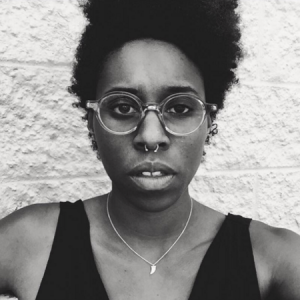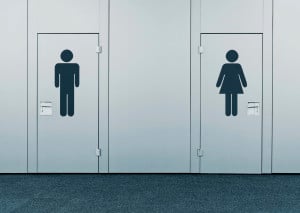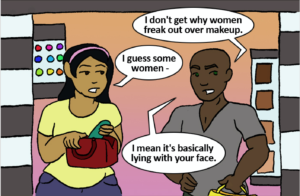
Source: Huffington Post
Nobody is perfect, but when people screw up and do oppressive things, we need to let them know what they did was wrong.
In social justice circles, we often do something called “calling out,” which usually includes someone publicly pointing out that another person is being oppressive.
Calling someone out serves two primary purposes: It lets that person know they’re being oppressive, and it lets others know that the person was being oppressive. By letting others know about this person’s oppressive behavior, more people can hold them accountable for their actions.
While staying silent about injustice often means being complicit in oppression, calling out lets someone know that what they’re doing won’t be condoned.
Calling out, essentially, aims to get the oppressive person to stop their behavior.
While I have absolutely no doubt that calling out has immense value – I do it all the time – it can be really difficult and sometimes counter-productive. I have come across situations where I think a more gentle approach would be more effective.
For example, when my best friend says something ableist, how should I approach it?
What about when my partner – a thoughtful, socially conscious person – says something that is subtly heterosexist?
What about people who aren’t consciously being oppressive? What about people who don’t speak English as a first language, and therefore don’t realize the oppressive connotations of some words?
Is there a more compassionate way of calling someone out?
There is a big difference between a person making a few screw ups and a person repeatedly engaging in hurtful behavior without apologizing.
If the ultimate goal is to get someone to change their problematic behavior, then we need to be intentional and strategic about how we encourage people to do that.
I recently came across the idea of “calling in” through this brilliant article by Ngọc Loan Trần on Black Girl Dangerous. They write:
“I picture ‘calling in’ as a practice of pulling folks back in who have strayed from us. It means extending to ourselves the reality that we will and do fuck up, we stray, and there will always be a chance for us to return. Calling in as a practice of loving each other enough to allow each other to make mistakes, a practice of loving ourselves enough to know that what we’re trying to do here is a radical unlearning of everything we have been configured to believe is normal.”
Much like calling out, calling in aims to get the person to change their problematic behavior. The primary difference between calling in and calling out is that calling in is done with a little more compassion and patience.
Sometimes people – especially people who are shy, new to social justice activism, or easily hurt – receive messages better when they’re sent gently.
As someone who is socially anxious and very sensitive, I often feel afraid to participate in certain spaces online because I’m too afraid I’ll say something wrong and be ostracized by the group.
Of course, my personal hurt is not an excuse for my oppressive behavior to go unchecked. But those who are mentally ill shouldn’t feel afraid to participate in these online spaces – when possible and appropriate, we should extend compassion to people, even when they’ve messed up.
I want to make one thing very clear: I am not advocating that people shouldn’t get angry at their own oppression.
Trans people have the right to get angry about transantagonism. Women and non-binary people have the right to get angry about sexism. Black people have the right to get angry about racism.
Calling people out allows us to hold people – particularly those who have privilege over us – accountable for their oppressive actions. It’s important that marginalized folks are allowed to do that, and it’s important that people who do oppressive things are held accountable.
I’m also not saying that calling people in is always and inherently better than calling people out. I think both calling in and calling out can be constructive in different circumstances.
Rather, I want to discuss another method of engaging with oppressive behavior.
Our activism, like our general behavior in life, should be as compassionate as possible, but for many of us, energy and compassion are not renewable resources.
We can burn out really easily. We can run out of patience. And some people are simply not worth our energy.
For our movement, and for our own self-care, we need to budget our compassion and not waste it on those who won’t return it.
But it’s really difficult to figure out when we’re wasting our energy on people and when we’re not.
Here are a few questions you might want to ask yourself when deciding whether you should call someone in or out.
1. Do I Have the Emotional Capacity to Call Someone in Right Now?
Dealing with oppression can be draining. Taking on the task of trying to reach out and possibly educate someone requires emotional energy.
Nobody should feel obligated to call someone in, especially when it’s too emotionally painful to do so. So before you call someone in, ask yourself if engaging with them will be more harmful to you than beneficial. You could always take a break and call them in later if necessary.
An alternative option is asking another person – perhaps an ally – to call them in and help educate them.
When it comes to activism, we need to take care of ourselves first. It’s not selfish to indulge in self-care when you need to; it’s important for your survival. We need to make sure we have the emotional and mental energy to keep going.
2. Do I Have Privilege Over Those Who Are Harmed by This Person’s Actions?
A huge part of allyship is talking to other privileged people and getting them to be supportive of marginalized groups.
It is exhausting for marginalized people to constantly call in people who have privilege over them, so our supporters should be doing that for us whenever they can.
Marginalized people should not have to educate their oppressors.
As a queer person, I should not be expected to educate every person who perpetuates heterosexism – intentionally or not. But I would really appreciate it if straight people attempting to work in solidarity with the queer movement would encourage other straight people to avoid engaging in oppressive behavior.
As a white person, I could do more to engage with other white people when their behavior or attitude perpetuates racism. Of course, I can’t go around compassionately educating every willfully ignorant racist.
But I can attempt to compassionately engage with those who, like me, are willing to learn more about oppression in order to better support people of color.
Calling people in is one of the ways in which this could be done.
3. What Are (Or Were) Their Intentions? Do You Think They’ll Change Their Behavior?
When it comes to supporting marginalized groups, the impact of our actions is more important than our intentions.
Let’s use a really simple example to illustrate this idea. Imagine that I am standing in the kitchen next to my friend, who is too short to reach something on the top shelf. I move over and try to grab it for her. In doing so, I stand on her toes. She then shouts out, “Ouch! You’re hurting me! Stop standing on my toes!”
In this situation, I didn’t intend for her to get hurt. I intended to help her. But it won’t be very helpful if I turn around and say, “But I didn’t meant to hurt you! I’m trying to help you! I refuse to get off your toes because it’s not meant to be hurtful!”
Instead, I should stop standing on her toes because it’s hurting her and then apologize. In fact, I should do the work, in advance, to be intentional about asking if she would like my help and how I should best support her in the process.
When it comes to supporting marginalized people, we might accidentally end up doing something more harmful than helpful.
In those situations, it’s not helpful to prattle on about how we never meant to hurt them. Rather, we should pay attention to people’s self-advocacy, engage with their complaints, and avoid hurting them as best as we can.
After all, if our intentions are good, we should be willing to take notice of people when they tell us how to support them. If we only mean well, we should understand the importance of apologizing and changing our hurtful behavior.
How does this fit into calling people in? Well, a person’s intentions might not make their actions any less harmful. But if someone truly has good intentions, they will be willing to change their behavior.
4. Why Exactly Did They Do This Oppressive Thing?
Sometimes, people make mistakes because they simply don’t know they’re making those mistakes.
For example, I met with a group of young high school girls recently to discuss feminism and social justice. One of the girls in the group referred to trans people as being “born in the wrong body” – a phrase many trans people object to.
Instead of calling her out on it, I called her in: I gently explained why the phrase isn’t okay to use and offered to e-mail some of the girls some information on trans-friendly language.
The reason why she used that phrase was because she was genuinely ignorant. High schools don’t usually offer much trans education, and the mainstream media often uses oppressive language or ignores trans issues altogether.
I thought about how eager, yet afraid I was to get involved in social justice when I was in high school. At that age, I didn’t need someone to shout at me for using a phrase I didn’t know to be oppressive – I needed a bit of guidance.
She was ignorant, but she was willing to learn. She immediately apologized and asked for more information. Since then, she’s started a personal blog on feminism and has gotten really involved in social justice activism.
I can’t help but feel that if I called her out with less compassion, she might have felt less confident and she wouldn’t have responded as she did.
In social justice activism, it is important that we invest what we can in one another’s growth and happiness. After all, humans drive the movement, and if we don’t take care of the each other, the movement becomes less powerful.
If someone is intentionally being an asshole, let them go. If someone is intentionally ignoring marginalized groups, let them go.
But if someone is engaging in oppressive behavior because they didn’t know it was oppressive – or because they had a momentary lapse in judgment – calling them in could be the most constructive move.
How Can We Call Someone In?
There is certainly no single, full-proof formula for calling in people effectively. That said, it can be helpful to have a flexible guideline on how to call someone in.
I have a general pattern which I use when I try to call people in, and I adjust it when circumstances change.
Firstly, it’s a good idea to figure out which method of communication would be best. Is it better to approach them in person? Would a message or phone call be more effective?
Sometimes it’s better to have the conversation privately, as sometimes a public conversation isn’t inappropriate. It depends on the nature of the oppressive thing they did and what kind of relationship you have.
For example, if someone uses the word “lame” – an ableist slur – when commenting on my Facebook posts, I usually just comment and explain nicely why I don’t want them to use that word on my posts.
However, if I am familiar enough with that person to know they might be scared or embarrassed about their mistake, a private conversation could be better.
After all, I’m more interested in helping them change their oppressive behavior than publicly shaming them for it.
Secondly, mention the specific action and explain why it was hurtful or oppressive. Maybe the person doesn’t understand exactly why their behavior is harmful.
Let them know how it impacts you directly, if it does. I’m personally really hurt by people perpetuating the stigma attached to mental illness, because I’m mentally ill.
So when someone does that, I explain how their actions hurt my feelings. I’ll be sure to explain how the stigma attached to mental illness directly prevents people like me from getting adequate mental health care.
The beauty of social media is that we can quickly link our friends to educational articles, thus saving us the effort of rehashing common arguments – use this advantage!
Lastly, we should be willing to have a discussion with them about their actions.
They might want to apologize for their actions. They might ask for help on changing their behavior or language. If we can help them, and if they’re willing to learn, we can attempt to guide them so that they become more conscious of their actions.
***
Social justice activism is essentially about people – it’s about supporting people, educating people and creating the sort of society where people’s autonomy, growth, and rights are nurtured.
In order to help people, we need to accept that people will screw up sometimes. Imperfection is part of humanity, a part of learning, and a part of growing.
Calling one another in is a way in which we can nurture the people within our movement — the people who, like us, are willing to learn but are bound to make mistakes from time to time.
It is essential that we think deeply about how we can hold each other accountable without hindering one another’s growth.
This way, we can create a sustainable, compassionate movement that nurtures the people who are part of it.
[do_widget id=”text-101″]
Sian Ferguson is a Contributing Writer at Everyday Feminism. She is a South African feminist currently studying towards a Bachelors of Social Science degree majoring in English Language and Literature and Gender Studies at the University of Cape Town. She has been featured as a guest writer on websites such as Women24 and Foxy Box, while also writing for her personal blog. In her spare time, she tweets excessively @sianfergs, reads about current affairs, and spends time with her gorgeous group of friends. Read her articles here.
Search our 3000+ articles!
Read our articles about:
Our online racial justice training
Used by hundreds of universities, non-profits, and businesses.
Click to learn more




















